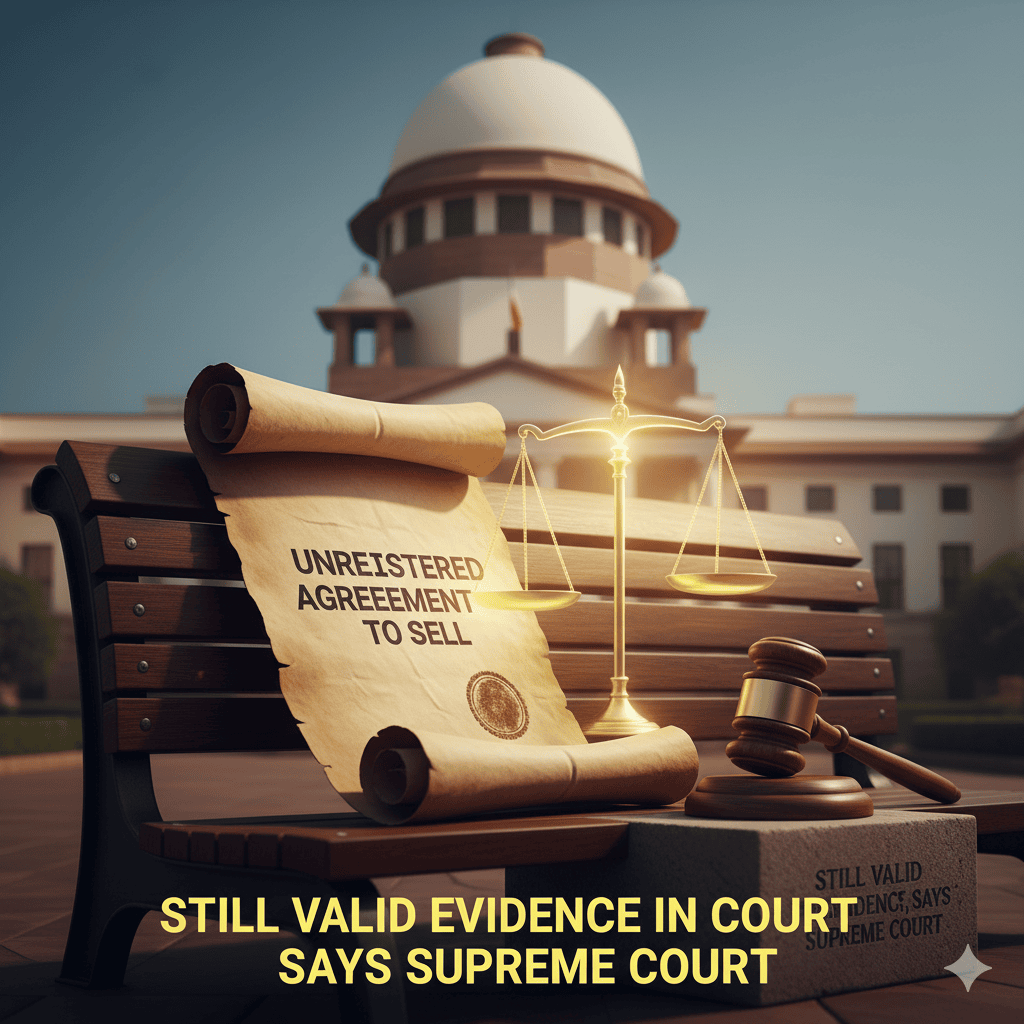💡 What’s the issue?
In many property deals, people sign an agreement to sell before they do the final registration of the sale deed.
Later, one party (often the seller) refuses to complete the sale — and the buyer goes to court asking for specific performance, i.e., asking the court to order the seller to finish the deal.
That’s exactly what happened in this case.

⚖️ What Happened in the Case
Mr. Muruganandam (the buyer) signed an agreement to sell with Mr. Muniyandi (the seller).
He claimed he paid the amount and even got possession of the property.
But the seller did not execute the sale deed (final registration).
When Muruganandam went to court, he tried to show the agreement to sell as proof.
The trial court and the High Court said:
❌ “This document is unregistered — you can’t use it as evidence.”
So, Muruganandam appealed to the Supreme Court.
🧾 Supreme Court’s Decision
The Supreme Court said the lower courts were wrong.
It clarified an important legal point:
🔹 Even if the agreement to sell is not registered,
it can be used as evidence to show that a contract existed between the buyer and the seller.🔹 However, it cannot be used to show that the property ownership has already been transferred.
In short:
👉 You can use it to prove a promise,
❌ but not to claim ownership.
🏛️ The Law Behind It (In Simple Words)
The Supreme Court relied on Section 49 of the Registration Act, 1908.
Normally, if a document that should be registered is not registered, it cannot be shown as evidence in court.
But there’s an exception (called a proviso).
It says that an unregistered document can still be accepted as proof of a contract in a suit for specific performance.
That’s the section the Supreme Court used to help the buyer in this case.
🧠 What is “Specific Performance”?
Specific performance means asking the court to force the other party to complete the deal as promised.
So if a seller refuses to sell the property after taking money, you can ask the court to order the seller to execute the sale deed.
This is common when property prices rise and sellers try to back out of old deals.
💬 What the Court Actually Said
The Bench of Justice P.S. Narasimha and Justice Joymalya Bagchi observed:
“Even though the document is unregistered, it can be received in evidence for the limited purpose of proving the existence of a contract in a specific performance case.”
The Court allowed Muruganandam to use the unregistered agreement as evidence and sent the case back to the lower court for trial.
🏠 What This Means for You
✅ You can show an unregistered agreement to sell in court to prove there was a deal.
✅ You can use it to ask the court to order the seller to complete the sale.
❌ But you cannot claim ownership of the property with that document alone.
🪜 Example
Let’s say:
You agreed to buy land for ₹20 lakhs,
You paid ₹5 lakhs in advance,
You signed an agreement (but didn’t register it),
The seller later refused to sell.
You can still:
👉 Go to court,
👉 Show your unregistered agreement,
👉 Ask for “specific performance” — i.e., for the court to direct the seller to execute the sale deed.
The court will accept your agreement as proof that a deal existed.
⚠️ Important Reminder
While this judgment helps genuine buyers, it doesn’t mean registration is unnecessary.
Registration protects you better and avoids future disputes.
Always remember:
Register your agreement to sell, especially if you pay money or take possession.
Keep proof of payment (bank receipt, cheque, etc.).
Mention all key terms — property details, price, and time limit.
Take legal advice before signing any property paper.
📣 Final Takeaway
The Supreme Court says:
Even if your agreement to sell is unregistered, you can still show it in court to prove there was a deal —
but it won’t prove you already own the property.
🧾 Case Summary:
Case Name:Muruganandam vs Muniyandi (Died) through LRs
Citation: 2025 INSC 652
Court: Supreme Court of India
Date of Judgment: 8 May 2025
Bench: Justice P.S. Narasimha & Justice Joymalya Bagchi
Key Point: Unregistered agreement admissible as evidence to prove existence of contract in a specific performance suit.

